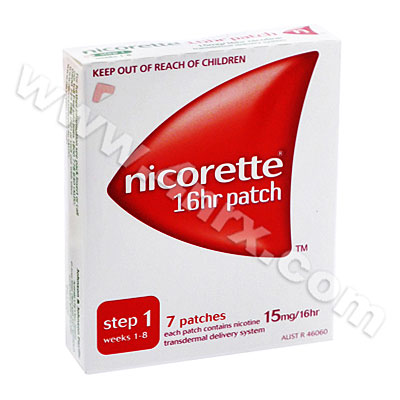 |
Home  General Health General Health  Nicorette (Nicotine) Nicorette (Nicotine) |
|
|||||||||
|
Nicorette (Nicotine)
What is Nicorette (Nicotine) used for? Nicorette (Nicotine) is used by smokers to help them quit smoking. These patches contain low levels of nicotine, which are sufficient to help prevent smokers from suffering from the harsh withdrawal symptoms associated with smoking, and to help reduce their craving for cigarettes while also helping the user to gradually adjust to less and less nicotine. How should I use Nicorette (Nicotine)? Nicorette (Nicotine) patches should be applied directly to areas of the skin that are clean, dry and hairless, such as the upper arm, chest or hip. You should change the location of the patch each day, and never apply it to the same site on consecutive days. You should discuss the correct dosage with your physician before starting this treatment. Usually patients are directed to apply one patch, which may either be a 5mg, 10mg or 15mg strength patch each day. The patches are usually applied in the morning and should be removed after 16 hours, normally at bedtime. The length of treatment is usually for 8 weeks at first, and if you have managed to successfully refrain from smoking for 8 weeks, there is another 4 week treatment using lower strength patches. A 10mg patch is used every day for 2 weeks, followed by a 5mg patch every day for another 2 weeks. What are the side effects of Nicorette (Nicotine)? Patients who use Nicorette (Nicotine) patches to help them quit smoking may notice side effects, such as:
Before you commence nicotine replacement therapy, you should discuss all of the risks of side effects with your physician, and seek immediate medical care if you notice any serious side effects. Please Note You should never smoke cigarettes while using these patches, as this may be extremely hazardous. If you have been using NRT for over 9 months, you should seek professional assistance and medical advice. Strictly follow all instructions provided to you by your physician or pharmacist while using Nicorette (Nicotine). Optimum and safe dosage can differ based on the patient and the condition being treated. As this medication may be unsafe for certain patients, it is essential you always inform your physician if you are pregnant or breastfeeding, as well as if you have any allergies, other illnesses, or ongoing health conditions, and if you are taking any other form of medication, supplements, or herbal products. Immediately seek emergency medical care if you have any allergic or hypersensitive reaction. Common signs of a reaction include hives, swelling, skin rashes, chest pains, as well as trouble breathing or swallowing. 
|
|||||||||||||||||